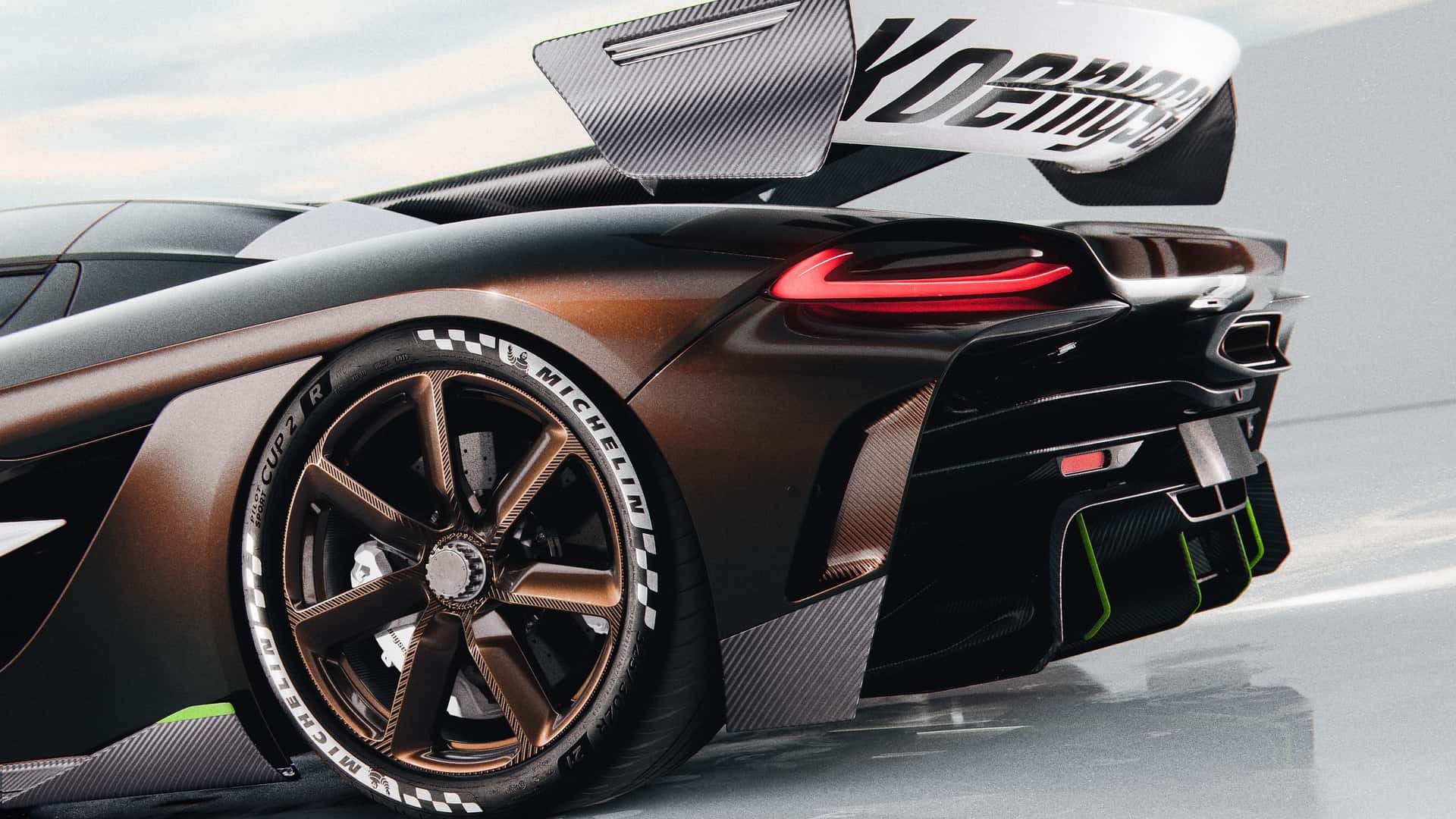10 Fast Cars From The '60s That No One Talks About
For well over a half-century, there have been endless friendly, and sometimes heated arguments over the fastest cars from the 1960s. That era not only included the Golden Age of Muscle Cars, but also the first great epoch of American performance. Whatever the beef is, it's a guarantee that GTOs, Chevelles, Chargers, Barracudas, Mustangs, and Corvettes are in the mix. There are, however, some seriously fast rides from that decade that are criminally overlooked, and which definitely deserve a little acknowledgment.
The top-shelf muscle and sports cars get all the attention, but there really were some amazingly fast cars that have been basically forgotten. Many of the top performance rides had sister or cousin models that packed just as much juice under the hood, but never gained the fame of the superstar nameplates. There were also quite a few full-size rides that could never qualify as a muscle car, but had the same aggression. Here are some of the fastest cars from the 1960s that nobody is talking about, but have earned a right to be part of the conversation.
In order to give you the most up-to-date and accurate information possible, the data used to compile this article was sourced from various manufacturers and other authoritative sources. Cars are ordered by manufacturer claimed top speed.

3/4 front view of white 1969 Pontiac Firebird Trans Am
Underdog Muscle Cars That Took On The Titans
Everyone knows the big names from the Golden Age of American Muscle, but there were some obscure rides that challenged them.
1969 Mercury Cyclone Cobra Jet
Top Speed: 122 MPH

Mecum
The Mercury Cyclone is one of the most tragically slept-on rides from the Golden Age, especially the second-gen. With a top-five aggressive body style for the entire era, the 1968-1969 Cyclone was as fast as it was cool. In 1969, Mercury introduced the Cyclone Cobra Jet with a 428ci V-8, ram-air, and a 735 CFM Holley four-barrel carburetor. Most definitely underrated, at 335 horsepower, this car was a menace on the streets with a 13-second quarter-mile on the track or in a red light challenge.
Power and Performance
Engine | 428ci Cobra Jet V-8 |
|---|---|
Horsepower | 335 HP |
Torque | 400 LB-FT |
Transmission | Four-speed manual |
0-60 Time | 5.5 seconds |
Quarter-mile | 13.9 seconds |
Top Speed | 122 MPH |
The reported top speed of 122 MPH is also probably a woeful understatement. The '69 Mercury Spoiler II, which was a Dodge Charger Daytona-style aerocar version of the Cyclone, set a record at that year's Daytona 500, with an average speed of 189.22 MPH. It's unclear if the Spoiler II was running the Ford FE 427 or the 428, but either way, the Cyclone Cobra Jet is likely much faster than the official number.
1966 Buick Super Wildcat
Top Speed: 124 MPH

Bring a Trailer
When it comes to classic Buick performance cars, the conversation generally starts with the 1965 Gran Sport and ends with the 1970 GSX. Despite having a way cooler name, the Buick Wildcat doesn't get a shout-out, but there were some mighty fast ones back in the day. In a weird way, this all kind of starts with the success of the 1964 Pontiac GTO, which Buick was trying to replicate with the Gran Sport. That was also a hit, so Buick applied GS performance trims to many of their models.
Power and Performance
Engine | 425ci V-8 |
|---|---|
Horsepower | 380 HP |
Torque | 465 LB-FT |
Transmission | Three-speed automatic |
0-60 Time | 7.4 seconds |
Quarter-mile | 15.5 seconds |
Top Speed | 124 MPH |
In 1966, for one year only, Buick offered the "Gran Sport Performance Group" package on the full-size Wildcat. There were two engine options; a 360-horsepower single-carb 425ci V-8 for the Wildcat GS and one with dual four-barrel carburetors that cranked it up another 20 ponies. The second option was known as the Super Wildcat, because, well, it was pretty darn super. Surprisingly quick for a land yacht, once the Super Wildcat got up to cruising speed it could peg the speedometer at over 120 MPH.
1968 Pontiac Tempest Custom
Top Speed: 124 MPH

Greg Gjerdingen/Wikimedia Commons
Most muscle car fans know that the GTO was originally the high-performance trim of the Pontiac Tempest, but maybe they forgot that this car continued on as a pretty kick-ass ride. The second-gen Tempest is the one that the GTO came from, and it was essentially the same car, but offered four-door sedan and station wagon versions. In 1968, the Tempest, like the GTO, got a new generation, and they were very different cars in terms of styling.
Power and Performance
Engine | 400ci H.O. V-8 |
|---|---|
Horsepower | 330 HP |
Torque | 380 LB-FT |
Transmission | Three-speed manual |
0-60 Time | 7.7 seconds |
Quarter-mile | 15.2 seconds |
Top Speed | 124 MPH |
Finally, with some sheet metal to call its own, the Tempest was quite striking with a shape not that dissimilar from the third-gen Dodge Charger, which wouldn't come until 1971. The '68 two-door Tempest Custom coupe came with a 400ci High Output V-8, that wasn't quite as powerful as the GTO Judge version, but got this forgotten muscle car moving. With an average retail price of just $15,800, according to J.D. Power, the '68 Tempest Custom is an incredible deal on some classic speed.
1964 Plymouth Belvedere
Top Speed: 126 MPH

Mecum
With the Barracuda and Road Runner getting all the attention, people forgot that the Belvedere was Plymouth's first real ass-kicker. In fact, the 1964 Belvedere is the most important Mopar muscle car, because it's the first one to get a 426 Hemi engine. The iconic wondermill was designed specifically to go into Richard Petty's Belvedere so he could destroy the field in NASCAR, which he did in '64, winning the first of many season championships.
Power and Performance
Engine | 426 Max Wedge V-8 |
|---|---|
Horsepower | 425 HP |
Torque | 480 LB-FT |
Transmission | Four-speed manual |
0-60 Time | 4.8 seconds |
Quarter-mile | 13.4 seconds |
Top Speed | 126 MPH |
The 426 Street Hemi wouldn't be available in a production vehicle until 1966, but the 1964 Belvedere had a reasonable facsimile in the 426ci Max Wedge V-8. With a dual-quad setup, the Max Wedge made just as much horsepower as the Hemi, and only 10 fewer pound-feet of torque. Much like the Hemi, the Max Wedge instantly transformed a regular ride into a street assassin. The '64 Belvedere was running in the low 13s, years before any other factory car could come close.
1969 AMC Super Stock AMX
Top Speed: 128 MPH

3/4 side view of 1969 AMC Super Stock AMX
Any AMC car could fill this slot for fast classic muscle cars that no one is talking about, because the now-defunct automaker's entire line-up is shamefully disregarded. We chose the 1969 Super Stock AMX for its insane speed and its decidedly killer looks. Though it was designed as a drag car, it was something that was actually sold at dealerships. It was, in fact, the dealers who painted a lot of them with the patriotic red, white, and blue color scheme.
Power and Performance
Engine | V-8 |
|---|---|
Horsepower | 340 HP |
Torque | 430 LB-FT |
Transmission | Four-speed manual |
0-60 Time | 4.0 seconds |
Quarter-mile | 12.4 seconds |
Top Speed | 128 MPH |
The real difference between a Super Stock and a run-of-the-mill AMX was that the 390ci V-8 got an extra four-barrel carb to really unleash the engine's potential. AMC published the Super Stock's output at 340, but that's a joke as the National Hot Rod Association (NHRA) rated it at 420, which is more like a car that can run in the low 12s. The claimed top speed is also a bit of disinformation, as race car driver Craig Breedlove got one of these suckers up to 189 MPH at the Bonneville Salt Flats, and even had an unofficial 200 MPH run.

Awesome-But-Forgotten-Things-About-The-1969-AMC-AMX
Awesome But Forgotten Things About The 1969 AMC AMX
AMC was not a well-known muscle car maker, but the AMX was a beast among monsters!
1968 Ford Thunderbird 429
Top Speed: 137 MPH

Mecum
It's not as if people suddenly forgot about the Ford Thunderbird, as it's one of the most iconic American cars ever made. Most folks, however, remember it as the fun,fun,fun T-Bird personal luxury vehicle, and not as the gunboat it became in its fifth generation. In 1967, the Thunderbird got an extra two inches of wheelbase and four more inches of overall length. For 1968, the Thunderbird got bigger under the hood as well with the addition of the 429ci Thunder Jet V-8 option.
Power and Performance
Engine | 429 Thunder Jet V-8 |
|---|---|
Horsepower | 360 HP |
Torque | 480 LB-FT |
Transmission | Three-speed automatic |
0-60 Time | 8.1 seconds |
Quarter-mile | 15.9 seconds |
Top Speed | 137 MPH |
The 429 didn't transform the full-size ride into a street machine, but it did give the Thunderbird a little more quickness. Once it got going, though, it could utilize almost every tick on its 140 MPH speedometer, making for a scary-fast, luxurious experience. In a way, this kept the T-Bird fun, because there was a delightful contradiction between its stuffy, uptight appearance and its freewheeling spirit, which was a rebel muscle car at heart.
1963 Dodge 330 Max Wedge
Top Speed: 140 MPH

Mecum
Maybe the reason why nobody is talking about the 1963 Dodge 330 Max Wedge is because they don't know what it is. It's neither a Polara nor a Dart, but then again, it's kind of both of those things. To complicate matters, there was a 1962 Dart 330, which was an entirely different car. The easiest explanation is that the 330, and its higher-trim 440 version, is that they were the transition from the mid-size second-gen Dart to the compact third-gen.
Power and Performance
Engine | 426 V-8 |
|---|---|
Horsepower | 415 HP |
Torque | 480 LB-FT |
Transmission | Four-speed manual |
0-60 Time | 5.3 seconds |
Quarter-mile | 13.7 seconds |
Top Speed | 140 MPH |
Really, the only important thing to know about this Mopar Rubik's Cube is that it could be equipped with the 426ci Max Wedge V-8. The 330's version of the unsung engine was rated at 10 ponies less than the "Street Wedge" of the '64 Belvedere, but it was still one hell of a blower of doors and feeder of dust. Not only could the 1963 330 Max Wedge win any street race, it had some serious top end to outrun the law when they busted up a friendly Saturday night competition.
1962 Chevrolet Impala SS
Top Speed: 150 MPH

Mecum
The Chevrolet Impala is another car people definitely haven't forgotten about it, but isn't talked about much in a certain context. The Impala has become legendary as a smooth cruiser and the lowrider's wheels of choice, but at one point it was the fastest car to come out of Detroit. In 1961, Chevy created the Super Sport trim for the Impala, and in 1962 they gave it the 409-horsepower 409ci V-8 that got this full-size screaming down the road.
Power and Performance
Engine | 409ci V-8 |
|---|---|
Horsepower | 409 HP |
Torque | 420 LB-FT |
Transmission | Three-speed manual |
0-60 Time | 5.9 seconds |
Quarter-mile | 14.6 seconds |
Top Speed | 150 MPH |
The '62 Impala SS was such a speedy game-changer that the Beach Boys wrote a song about it, titled appropriately "409." An argument can be made that, since this car has been enshrined in song and loved by enthusiasts, it doesn't qualify as a fast car that no one is talking about. Thankfully, there is a loophole because the Impala SS 409 is not remembered as a performance ride or a proto-muscle car, which it clearly was.

3/4 front view of red 1964 Chevrolet Impala SS
Why The Chevy Impala Is Still A Hot Commodity On The Used Market
From low riders to muscle cars to classic cruisers, the Chevy Impala has a broad appeal that drives a sizzling used car market.
1966 Ford Galaxie 500 7-Litre
Top Speed: 150 MPH

Mecum
The Ford Galaxie got some love from Reverend Horton heat in his ultimate break-up song, "Galaxie 500," but has nothing to do with the vehicle's performance, and almost nobody remembers how fast this baby could go. Introduced in 1966, the Galaxie 500 7-Litre, was equipped with a 428 Thunderbird V-8, good for 345 horsepower. There was a version for the law enforcement-only "Police Interceptor" that jacked it up 360, but it wasn't available to civilians.
Power and Performance
Engine | 428ci V-8 |
|---|---|
Horsepower | 345 HP |
Torque | 426 LB-FT |
Transmission | Four-speed manual |
0-60 Time | 7.4 seconds |
Quarter-mile | 15.5 seconds |
Top Speed | 150 MPH |
In '66, the Galaxy also got a sheet metal refresh with a slight Coke bottle design, that remains the baddest style the full-size ride ever had. Looking good and going fast has been a winning combination since the beginning of the automobile, and the '66 Galaxie 500 completely nailed it. Spelling "liter" as the European style "Litre" was an odd choice, but nobody who wound this beauty out over the 100 MPH mark cared, as they were having too much fun.
1963 Studebaker Avanti
Top Speed: 178 MPH
The 1962-1963 Studebaker Avanti is either the weirdest performance car ever mass-produced or the coolest, and it may occupy the rare position of being both. Meant to compete with the Ford Thunderbird in the personal luxury car segment, Studebaker decided that much of that opulence should be in the form of ass-kicking power. The gambit paid off, and for a brief moment, the Avanti was "the fastest production car in the world", which is exactly how Studebaker promoted it. Because the design was so unique, AKA complicated, it was decided that sheet metal wouldn't work and so it was clad in 36 individual pieces of fiberglass.
Power and Performance
Engine | 304ci supercharged V-8 |
|---|---|
Horsepower | 335 HP |
Torque | 370 LB-FT |
Transmission | Four-speed manual |
0-60 Time | 6.3 seconds |
Quarter-mile | 14.9 seconds |
Top Speed | 178 MPH |
There's actually a bit of confusion on the Interwebz about the actual output of the Avanti engine, but that comes from the fact that there were four different engines that ranged from 240–400 horsepower. The displacements went from 289 cubic inches to 304, and three of the four were supercharged. For the purposes of top speed, the R3 supercharged 304ci V-8 is the money engine because that's the one that did the Bonneville Salt Flats flying mile at 168 MPH, and then hit 178.5 MPH in the 10-mile run. The Avanti never really caught on, and it's certainly an acquired taste, but it was the fastest car of the entire 1960s, and deserves to be part of every performance discussion.













































